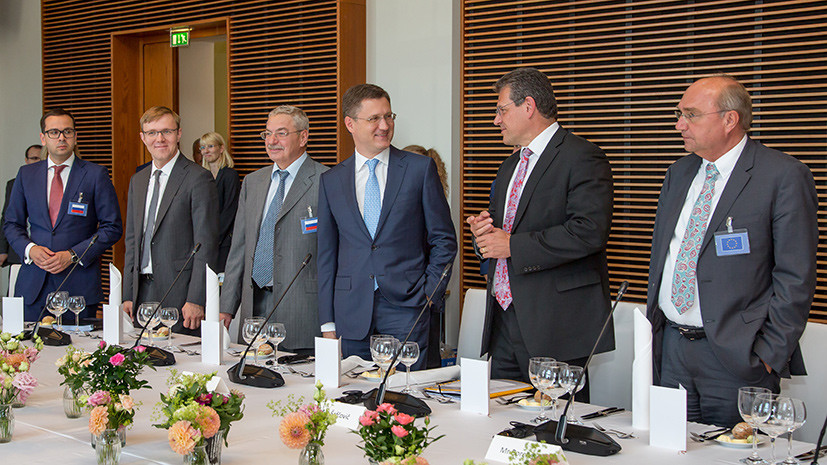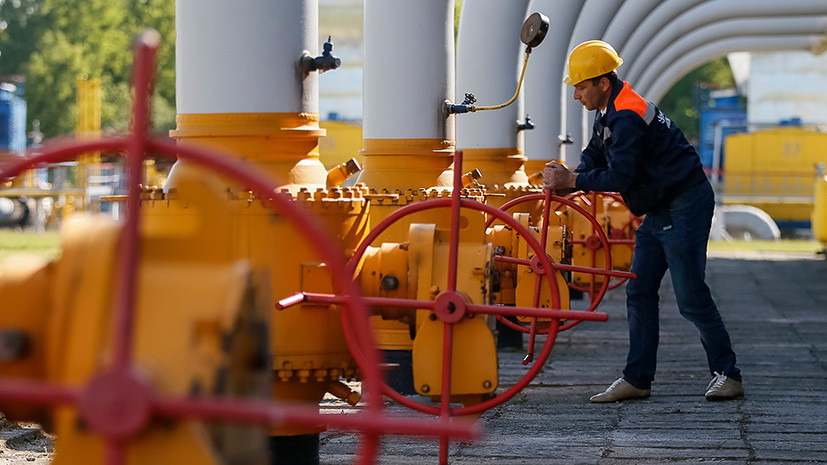July 17 in Berlin, there were three-way talks on the supply of Russian gas to Europe. Representatives of Moscow, Brussels and Kiev exchanged positions on the conditions of transit through the territory of Ukraine after 2019. The parties were represented by the Russian Energy Minister Alexander Novak, the Deputy Head of the European Commission for the Energy Union Maros Shefovich and the Foreign Minister of Ukraine Pavel Klimkin. The discussion was also attended by Gazprom CEO Alexei Miller and Naftogaz head Andrei Kobolev.
The meeting was held against the backdrop of political debates related to the construction of the Nord Stream-2. On the eve of the bilateral Russia-US summit in Helsinki, President Vladimir Putin assured his US counterpart of the preservation of gas transit through Ukraine in the event that the conflict between Gazprom and Naftogaz is settled in Stockholm Arbitration. Meanwhile, Donald Trump believes that the gas pipeline puts Europe in dependence on Russia and continues to oppose the project.

- Minister of Energy of the Russian Federation Alexander Novak, vice-president of the European Commission for Energy Union Maros Shefovich at the trilateral talks of Russia, Ukraine and the European Commission on gas transit.
- © Ruptly / RIA Novosti
"Balance must be restored"
In Europe, however, this is looked at differently. So, after the meeting in Berlin, the parties gave comments to the press about the agreements reached. According to Alexander Novak, the talks were calm and constructive, and their outcome was a preliminary agreement on the conclusion of a new treaty.
"We primarily discussed the continuation of the current contract or the conclusion of a new contract, that is, the use of the GTS since 2020. Key issues for the continuation of cooperation for the Russian side is the settlement of disputes in an arbitration court in Sweden. The balance of interests of commercial offers that are beneficial to consumers, suppliers, companies that operate the Ukrainian GTS should be restored. This balance needs to be restored so that the relationship continues after 2019, "the minister said in a conversation with RT.
Novak explained that in case of an amicable agreement with Naftogaz and Gazprom, Moscow is ready to extend the existing contract for the transit of gas through Ukraine, or conclude a new one. At the same time, the rate will be discussed later, in October, but the volumes, preliminary, will grow by 10-15% within the next 5-10 years.
"We see that consumption in Europe is growing, we see that the volumes of gas supplies and transit through the territory of Ukraine are increasing, including. And this is due to the general increase in consumption in Europe as a result of 2017, and already in 2018 - a 6% increase in consumption recorded in the first half. In addition, for today we already understand that for the next 5-10 years, the volumes of supplies to European consumers will be even greater than in 2017-2018, we can talk about an additional 10-15% growth. Just these additional volumes were discussed, "the minister said.
Earlier, the head of Gazprom Alexei Miller said that gas exports to Europe in 2018 could reach a record 200 billion cubic meters. m. The main factors of growth, he called improving the economic situation in Europe and reducing the production of European gas. In 2017, Gazprom increased gas exports to Europe by 8.4%, to 194.4 billion cubic meters. m.

- © Gleb Garanich / Reuters
EU representative Maros Shefovich after the talks also called the meeting "useful, open and constructive". The official said that in autumn the development of a new "good transit contract" will begin taking into account the assessment of the EU's needs for 10 years. At the same time, it will be performed by a new operator of the GTS, he added.
In Naftogaz itself, however, they made it clear that they could take all the obligations back in an instant. So, a few hours after the meeting, the company announced the inadmissibility of creating an independent company for the operation of the GTS.
"Immediate separation of the operator of the gas transportation system will require either obtaining a written consent from Gazprom to join the contract for a new operator, or reaching certain agreements with Gazprom on making appropriate changes to the existing contract. None of these options is achievable, "the company said.
Disagreed in positions
Energy Minister of Russia Alexander Novak at the meeting proposed an amicable agreement between Gazprom and Naftogaz, although he specified that this situation is beyond the competence of the expert community and concerns only two companies.
"This issue was also touched upon, this is one of the options for settling the relationship, but this was discussed as one of the options. No decisions on this matter have been made. I think that all these issues will be discussed additionally at the next consultation in October, "he said after the talks were over.
However, the Ukrainian Foreign Minister later said that an amicable agreement between Gazprom and Naftogaz was unacceptable.
"Russia's attempt to agree on extrajudicial settlement
cases where the Stockholm Tribunal has already rendered a decision
will pass. It is necessary to follow generally accepted legal norms and
international law, "he wrote on Twitter
Спроба Росії домовитись schodo позасудового проградування справ, по яким Stockholm tribunal вже виніс рішення, не проде. Comply with the legal requirements of the legal norms and the international law pic.twitter.com/MIupLNMAdL
- Pavlo Klimkin (@PavloKlimkin) July 17, 2018Recall that the conflict between the Russian and Ukrainian companies continues from the beginning of 2018. In February, the Stockholm Arbitration Court ruled on the dispute of the companies. His demand was compensation by Gazprom to the Ukrainian side of $ 2.6 billion. Then in March the Russian company terminated the contract with Ukraine due to the economic inexpediency of its compliance for Gazprom and filed a complaint against the court's decision.
After that, Naftogaz filed a second lawsuit on a new dispute over the transit tariff. Gazprom also appealed to the court. Both companies continue and now to find out the attitude in court.
History with continuation
Refusing the "world" with "Gazprom," Ukraine expects to get a more winning negotiating position in the future, said Alexander Pasechnik, head of the analytical department of the National Energy Security Fund. However, such political speculation may eventually turn against Kiev itself.
"Given that this is still a test round of negotiations, and the autumn-winter period is still ahead and there is time for maneuvers," the expert said in an interview with RT.
According to him, over time, the issue of the "winter package", in which the EU is most interested, will become the most acute.
"Closer to the winter may increase the intensity of negotiating rounds. Nobody wants to freeze. Considering that while there is no complete detour around Ukraine, this is an important issue. It is possible that Kiev's attempts to speculate, push to accelerate the implementation of the "Nord Stream - 2. Heavyweights of the Eurozone, such as Germany or Austria, understand that this project is primarily the security of Europe," concluded Pasechnik.
